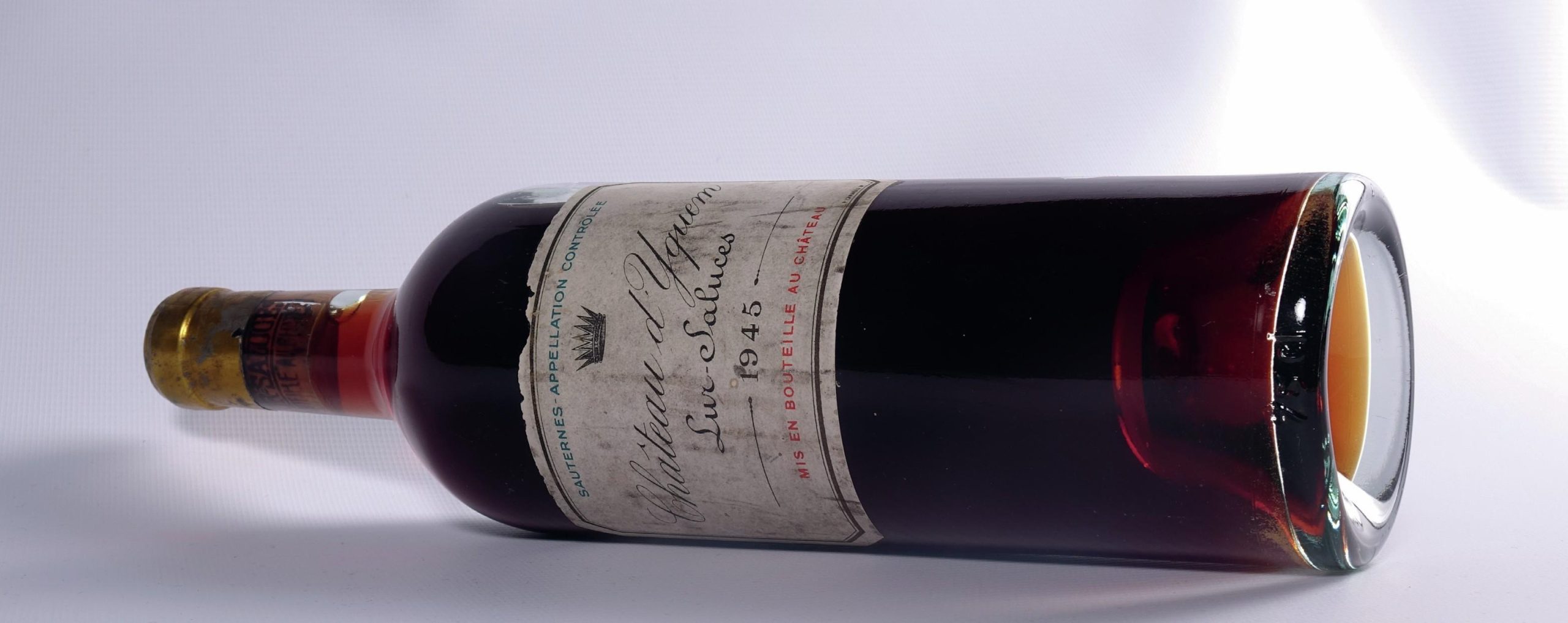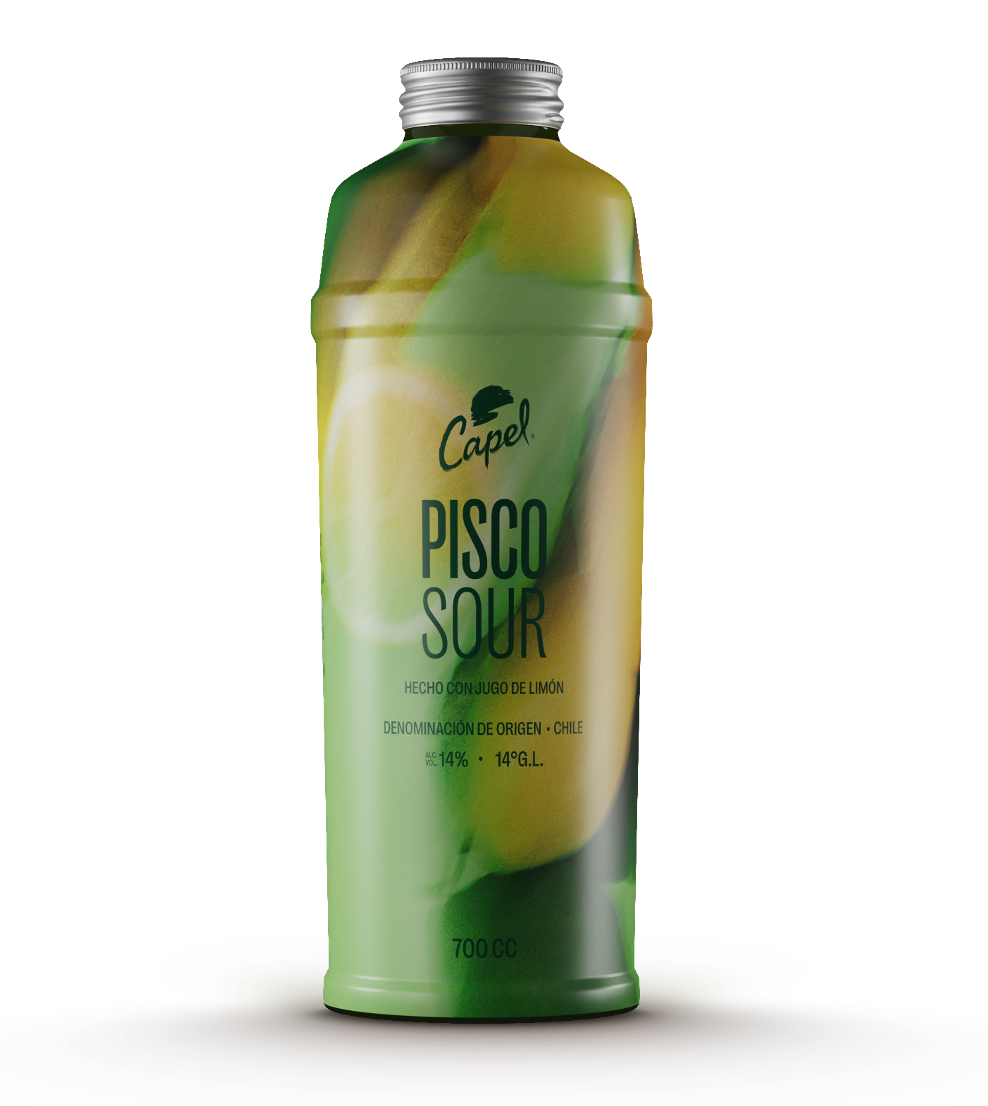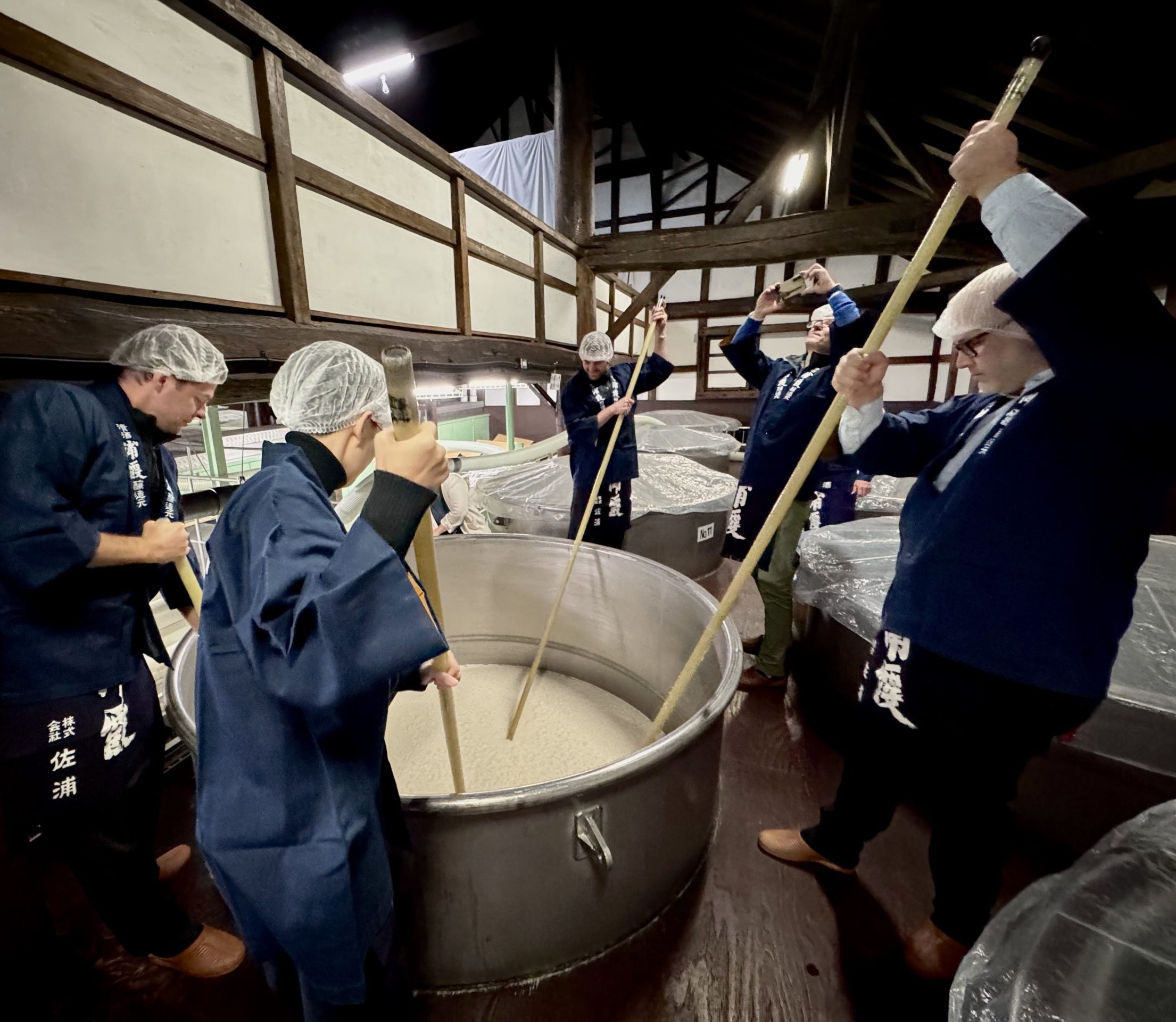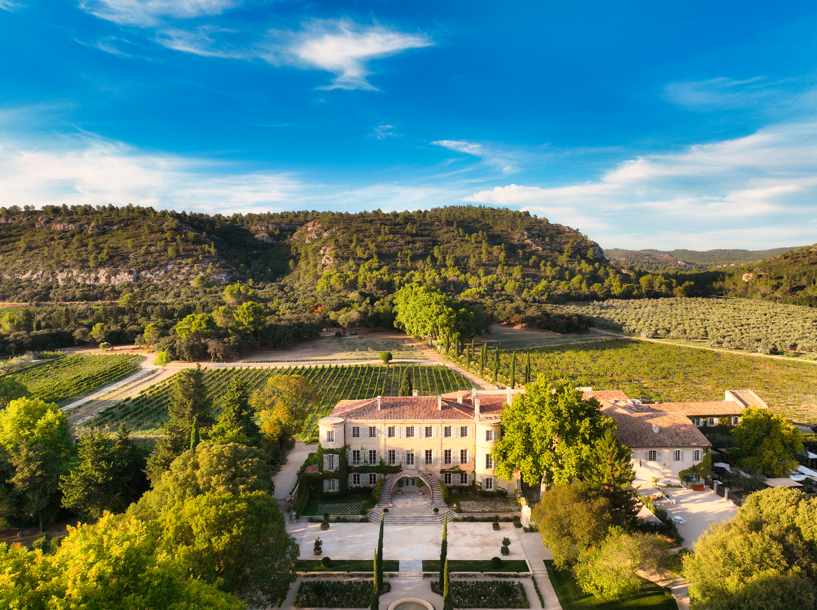Sauternes & Barsac 2022: full tasting notes
Sauternes and Barsac are typically overlooked en primeur, but our Bordeaux correspondent Colin Hay finds much to celebrate, with some excellent, if diverse, wines. Here are his full tasting notes.
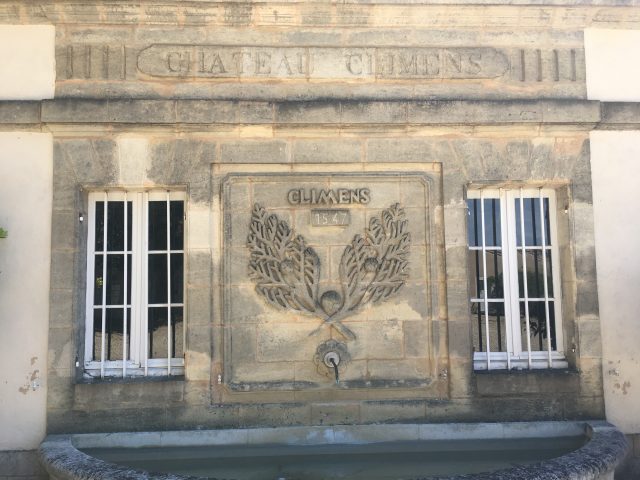
A note on the ratings
This year, as for the 2021 vintage before it, I have decided to provide an indicative rating for each wine alongside the published comment. All such comments and ratings are necessarily subjective (they cannot be anything else, when one thinks about it). I would urge you to look at the two together and, if anything, to privilege the comment over the rating. My aim is more to describe the wine in the context of the vintage, the appellation and recent vintages of the same and similar wines, rather than to judge the wine per se.
The ratings, of course, reflect my subjective evaluations and relative preferences between wines. Your palate is likely differ from mine. I hope that my comments give you at least enough information to be able to recalibrate my ratings and, in so doing, to align them more closely to your palate. To give an example: if the idea of the ‘new classicism’ leaves you cold, you may well wish to discount the (typically high) ratings I have given to wines described in such terms.
2022 is, of course, a far from entirely homogeneous vintage – and, consequently, my ratings span a considerable range (from the very top of the scale downwards). I see little interest, either for the consumer or the producer, in publishing very low scores. Consequently, I have decided not to publish scores for wines that I have rated below 90 (here the range 89-91). Where no rating is published, the wine would have scored 88-90 or below.
Finally, élevage is likely to be very important in determining the quality in bottle of these wines (like 2021 and rather more so than in other recent vintages). I am no soothsayer and cannot predict how that will turn out. All en primeur ratings should be treated with caution and taken with a certain pinch of salt.
Detailed tasting notes
- Domaine de L’Alliance 2022 (Sauternes; 80% Sémillon; 10% Sauvignon Blanc; 10% Muscadelle; 142 g/l of residual sugar; 14% alcohol). Pure, highly bortytised with burnt sugar, pineapple compote, roasted pineapple and toasted patisserie notes, a little peach and apricot. Lovely balance and just enough freshness and acidity. 92-94.
- Bastor-Lamontagne 2022 (Sauternes; 55% Sauvignon Blanc; 45% Sémillon; 13.5% alcohol; tasted at the UGC press tasting). Bright, fresh, intensely sweet and richly botrytized, with confit melon, pineapple, confit lime, homemade lemonade, clementine peel and tarte au citron vying for one’s attention. There’s a little vanilla and sweet spices too. Lovely fresh pineapple on the palate – so juicy and pure and just a little hint of caramel au beurre salé. A really lovely wine. So sapid and juicy. The first of the Sauternes flight at the UGC and setting a high standard. 93-95.
- Bonneau de Chateau Closiot 2022 (Barsac; 100% Sémillon from the Clos Bonneau plot surrounding Château Closiot; several sortings, vertical pressing; vinification in barrels, 60% of which are new; 13.7% alcohol). Lanolin – reminding me immediately of older vintages of Lafaurie Peyraguey. Pineapple, confit pineapple, roasted pineapple too, caramel, candy floss, burnt sugar, ginger, white melon, satsuma and tarte au citron. Lovely richness with an intense botrytis bringing impressive concentration and yet with a lithe and limpid juicy freshness. Nothing that isn’t in perfect harmony, everything in equilibrium. Excitingly expressive and vivid. 93-95.
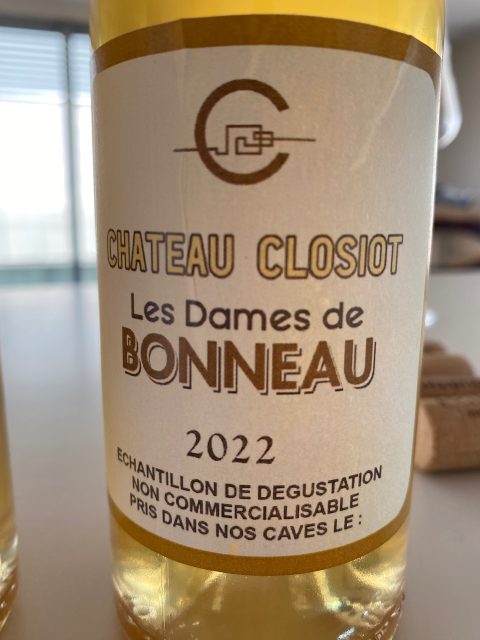
- Broustet 2022 (Barsac; 90% Sémillon; 7% Sauvignon Blanc; 3% Muscadelle; a final yield of 7 hl/ha; 13.8% alcohol; tasted at the UGC press tasting). Interesting, different and likely to represent excellent value, if not quite at the level of Bastor-Lamontagne. Confit pear, fresh and crystallised ginger, peanut brittle with a little fleur de sel. This is fresh and lithe on the finish just when and where it needs to be. A lovely balance between depth and bright crisp fresh-fruitedness. 92-94.
- Climens 2022 (Sauternes; 100% Sémillon; a final yield of just 7.5 hl/ha but there is very little second wine; 141 g/l of residual sugar; 14.4% alcohol; tasted in Bordeaux). Picked in two tries over 4 and 5 days respectively between October 6th and 23rd. Very Climens. So fresh and wild and natural and floral, we pick up the acacia, the fennel, the mimosa and even the jasmine note that we find in Asphodèle. There’s also acacia honey, melon in various form and varieties – confit as well as fresh – gooseberry, pear skin and subtle hint of apricot. On the palate this is incredibly rich and dense and tightly structured – with a very clear spine and the fruit tightly bound and wound around it (like a horizontal climber to its stake). Energetic freshness with circulating whirlpools around that spine of sapid fruit juice. Perfect tension, staying very fresh all the way to the vanishing point. Caramel and butterscotch but with caramelised satsuma rind for the freshness. Excellent. Like the 2010 – very floral whilst remaining incredibly fresh – and very tense. The wine of the vintage for Sauternes and Barsac. 97-99.
- Clos Haut-Peyraguey 2022 (Sauternes; 80% Sémillon; 20% Sauvignon Blanc; a final yield of just 9 hl/ha; 14% alcohol; tasted at the UGC press tasting). Almost a return to an older style here, when the chateau was still clad with climbing flowers that one picks up here again on the nose (it was always said that the wine has the aromatics of the flowers that enrobed the Château and I am reminded of them here). Confit grapefruit, fresh grapefruit and grapefruit zest – so pure and brilliantly fresh; a little beeswax and floral honey. I love the clarity, focus and precision of this; I also love the ginger on the finish – ginger ale and fresh ginger above all. Another truly great Sauternes. 93-95.
- Coutet 2022 (Sauternes; 95% Sémillon; 4% Sauvignon Blanc; 1% Muscadelle; 158 g/l of residual sugar; 13.9% alcohol; tasted at the UGC press tasting). A little more closed at first aromatically than many, and there’s nothing wrong with that at all. Mandarin, blood orange zest, confit melon, angelica, caramel au beurre salé, candlewax, almonds and frangipane, marzipan too. Very sweet but with a racy brilliant bright acidity. Fabulous. Zesty on the finish and it needs to be to cut that sweetness. This is just about in balance, but a little close to edge and, as such, quite a singular vintage of Coutet. 93-95.
- Les Dames de Bonneau de Chateau Closiot 2022 (Barsac; 100% Sémillon; from an ultra-strict selection of Sémillon grapes from the Clos Bonneau plot surrounding Château Closiot, vertical pressing, fermentation in 100% new barrels; 189 g/l of residual sugar; 13.7% alcohol). Nectar, pure and simple; amazing concentration and yet amazing freshness too. Very much a tete de cuve in the image of L’Extravagant de Doisy-Daëne. A little struck match, lanolin (again, but less than with Bonneau), peanuts freshly plucked from the shells and then sprinkled with fleur de sel, beeswax, acacia honey, cinnamon and extract of pineapple, saffron too. Amazingly sweet (189g of residual sugar per litre) and hence great intensity, concentration and viscosity – a certain agelessness too. Creamy, rich, with pronounced rôti botrytis notes, toasted almonds, peach, apricot and Mirabelle, crystallised ginger. An incredible wine. So sapid and juicy on the finish too – but it needs to be to cut the viscosity and sucrosity. 95-97.
- Doisy-Daëne 2022 (Barsac; 92% Sémillon; 8% Sauvignon Blanc; a yield of an impressive 18 hl/ha; 150 g/l of residual sugar; 13% alcohol; tasted at the UGC press tasting). Quite floral with a hint of verbena too alongside the white pear, confit pear, melon, mandarin and wild floral honey. There’s a lovely hint of freshly grated ginger too that is very present on the palate as well (though less pronounced than with Doisy-Dubroca). Lovely mineral salinity and a beautiful fruit-juicy freshness that brings great dynamism to the mid-palate and the finish. The botrytis complexity is fabulous. 93-95.
Partner Content
- Doisy-Dubroca 2022 (Barsac; a tiny property of just 1.5 hectares given a new lease of life by Jean-Jacques Dubourdieu; 100% Sémillon). Gingerbread, ginger, confit ginger and crystallised ginger (you get the common theme!); a little pineapple, peach, apricot, maybe even a little wild strawberry; just a suggestion of lanolin. Limpid, crystalline, fluid; very sweet but a lovely confit melon, citron pressé and tarte au citron. A fabulous suggestion of white grapefruit zest. Lovely harmony; nothing out of place. Fabulous and that lovely return to fresh ginger on the finish. Maybe less complex than Doisy-Daëne but at least as good and perhaps even more harmonious. 94-96.
- Doisy-Védrines 2022 (Sauternes; 9% Sémillon; 8% Sauvignon Blanc; 2% Muscadelle; a final yield of just 8 hl/ha; 13.5% alcohol; tasted at the UGC press tasting). Perhaps the freshest on the nose with assorted citrus elements vying with the passionfruit and passionflower for attention. Confit melon too and a hint of citrus rind. A little more oak influence, with vanilla and walnut shell and gentle spices. Diaphanous on the palate where I pick up fresh pineapple. Lovely sapidity, very juicy, complete. 92-94.
- L’Extravagant de Doisy Daëne 2022 (Barsac; 100% Sauvignon Blanc). Lanolin, acacia honey, white flowers, fleur de sel, peanut brittle, confit melon, angelica, a million shades of citrus, white pear, satsuma. Perfect harmony and radiantly dynamic on the palate – the acidity and fluid freshness is just exquisite and produces waves of freshness and ripples of tension between the sucrosity and the freshness. Perfect harmony. Just brilliant. Very special and really the only wine really capable of balancing so much residual sugar because of its natural -super-charged Sauvignon Blanc acidity. 96-98.
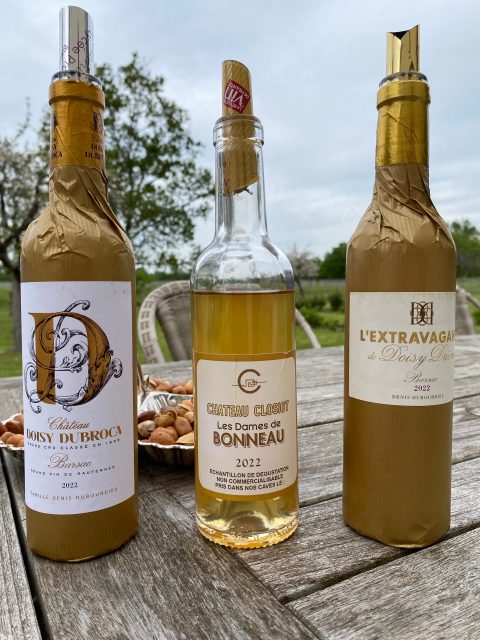
- De Fargues 2022 (Sauternes; 80% Sémillon; 20% Sauvignon Blanc; 140 g/l of residual sugar; 13.7% alcohol; tasted at the UGC press tasting and then at Ripeau). So intense, but also so true to itself with that familiar honeyed complexity – beeswax, candlewax, fresh ginger, crystallised ginger, angelica, walnut, fresh and confit melon, pineapple and green apple skin. Immense and so layered and complex, yet so profoundly fresh and juicy. The most brilliant botrytis and a complexity that is present even here only in a handful of vintages. A pronounced salivating salinity and a lovely lingering note of salted pistachios on the finish. 96-98.
- Guiraud 2022 (Sauternes; 70% Sémillon; 30% Sauvignon Blanc; 134 g/l of residual sugar; 13.65% alcohol; tasted at the UGC press tasting). Very fresh and fruity on the nose, less evidently sweet than most. Lots of citrus notes – citron pressé, tarte au citron, lemon meringue pie, frangipane too and fleur de sel. Rich and full with the freshness coming like a wave at the end, cleansing the palate just as you think it’s not going to come. Remarkably juicy and refreshing with a very long tapering sapid finish. 92-94.
- Haut-Bergeron 2022 (Sauternes; 90% Sémillon; 8% Sauvignon Blanc; 2% Muscadelle; tasted at Ripeau). A fabulous wine, I suspect, but the sample is not the best. One feels the lovely fluidity on the palate and the brilliant freshness that is brought to re-energise the mid palate as the pineapple and citrus notes combine to release a wave of cool sapidity; but the nose is all out of shape. I’m sure that this is the sample not the wine. NR.
- Lafaurie-Peyraguey 2022 (Sauternes; withdrawn from the UGCB press tasting seemingly at the last minute). I tried all manner of means to taste this but, alas, without success. With 260 g/l of residual sugar it is clearly more TBA than Sauternes but no less fascinating for that. With concentration like that (and, presumably, a paltry yield to match) I guess that it’s hardly surprising that there aren’t many samples, but it pains me not to have had the chance to taste this. I look forward to the day I will get to review this. NR.
- Liot 2022 (Sauternes; 80% Sémillon; 15% Sauvignon Blanc; 5% Muscadelle; 115 g/l of residual sugar; 13/6% alcohol; tasted at Ripeau). Pure, precise, rich and fresh, with pineapple and confit pineapple, a little fresh ginger, melon and maybe even fresh grapes – something of the fresh fruit cocktail about it; but also a little frangipane and patisserie. Less botrytis than many and less complexity as a consequence, but a reliable well-made wine and very freshly fruited on the finish – like chewing on a pineapple husk! 90-92.
- Nairac 2022 (Sauternes; 92% Sémillon; 6% Sauvignon Blanc; 2% Muscadelle; 150 g/l of residual sugar; 14% alcohol; tasted at Ripeau). This has a lovely rich nutty and rôti botrytis. Butterscotch, white pear, confit melon. Pure, soft, gently sapid.. A little pineapple too. Fine, with saline hint on the finish – salted pistachio perhaps. 92-94.
- Raymond Lafon 2022 (Sauternes; tasted at Ripeau). Peanut brittle with fleur de sel. Crystallised ginger. Candlewax. Candied satsuma rind. Very ripe, almost lacks a little acidity and sapidity – just enough there. Candied melons. Long but just a bit too much sugar and not enough freshness. 91-93.
- Rayne Vigneau 2022 (Sauternes; 74% Sémillon; 25% Sauvignon Blanc; 150 g/l of residual sugar; tasted at the UGC press tasting and again at Ripeau with similar notes). Saline. Confit melon. Apricot jam. Wild strawberry. This feels incredibly sweet, a little disconcertingly so at first. Peanut brittle, walnut shell, frangipane, butterscotch, caramel au beurre sale. I fine this almost too sweet and incredibly viscous. It has remarkable intensity and so much botrytis character, but I’m fearing for my teeth. The freshness comes, it seems, only from the botrytis. Though, somewhat paradoxically, there is definite sapidity. It is also extremely pure and precise. Others might like this more than me and recall that this is a wine that has really wowed me in the recent vintages, but I find it almost too much here and somewhat out of character. 91-93+.
- Romer de Hayot 2022 (Sauternes; 90% Sémillon; 10% Sauvignon Blanc; 110 g/l of residual sugar; 13.5% alcohol; tasted at Ripeau). Fresh and pure without a great deal of botrytis complexity but lovely still. Peach, apricot jam, assorted citrus notes, rind and peel. Fresh. This has a pleasing sapidity, but it is lacking the intensity of the very best. 91-93.
- Sigalas Rabaud 2022 (Sauternes; 100% Sémillon; tasted at the UGC press tasting and again at Ripeau). So crystalline and so floral, an exquisitely beautiful wine with a shimmering mouthfeel. Intense citrus notes alongside the delicate white flowers – a little Climens like. Pear and peach. Church candles, maybe a hint of incense, fifty shades of citrus and even a suggestion of wild strawberry. Very powerful but very gracious and elegant too. Exquisite. 94-96.
- Suduiraut 2022 (Sauternes; 100% Sémillon; a final yield of just 7 hl/ha; 194g/l of residual sugar, the higher ever; 13.2% alcohol; tasted at the UGC press tasting, at Ripeau and again at Pichon Baron with Pierre Montégut). There were three tries here – with 10% of this coming from passerillé grapes harvested before the (late) onset of botrytis (and crucial, here, for the freshness). The rest comes from the second and third tries of botrytized grapes at two degrees of concentration (significant and intense!). Big and rich with lots of botrytis character as you might imagine and even more ‘Suduiraut’ character – this is a vintage made to reinforce the style of Suduiraut. Toasted almonds, frangipane; so lively and vertically fresh, I find this charged with white grapefruit zest and juice, melon confit, white pear and the texture of its skin. Slightly floral too. Rich and thick. Apricot jam. Suduiraut in 2022 has an aerial quality that is rare in the vintage and it is the fresh juiciness from the pasillerillé grapes that is so crucial to the success here. Confit blood orange. Fleur de sel. Super rich and viscous. Like the 2010 and so expressive of its Suduiraut identity. 96-98.
- La Tour Blanche 2022 (Sauternes; 83% Sémillon; 12% Sauvignon Blanc; 5% Muscadelle; 145 g/l of residual sugar; tasted at the UGC press tasting). Orange zest, lanolin, pineapple, a little white peach skin, butterscotch (massively so) and salted caramel, burnt sugar and candyfloss, but also a remarkable salinity and freshness too. There’s that peanut brittle note again – and fresh ginger on the super-fresh finish. Juicy and so refreshing, though with a lot of sugar and only just enough acidity. 93-95.
Related news
Areni Global: 'We have to find a way to make wine consumption safer' for women amid spiking fears
All the medallists from The Global Cabernet Franc Masters 2026

